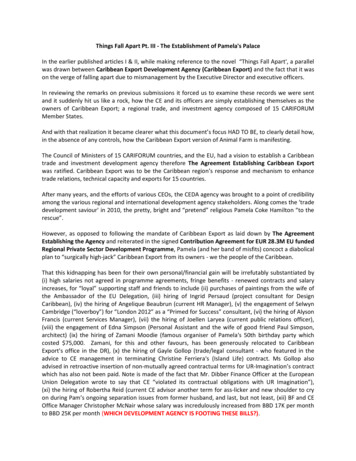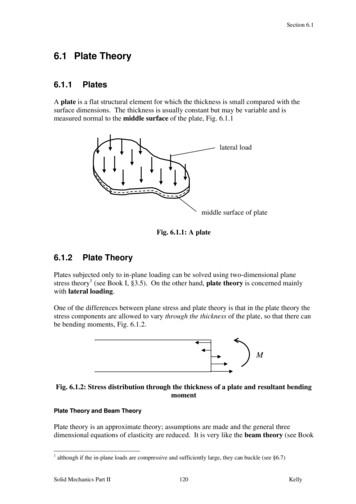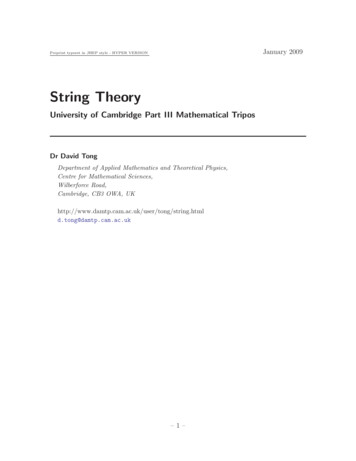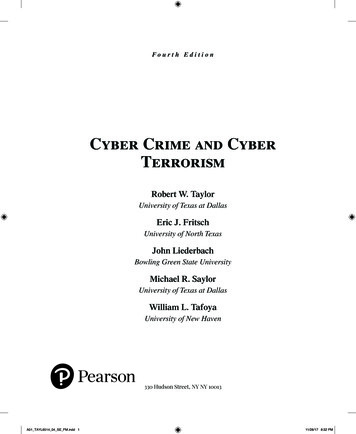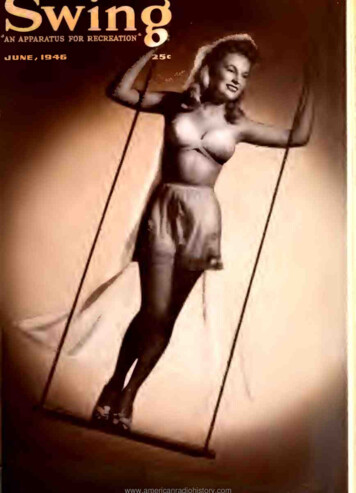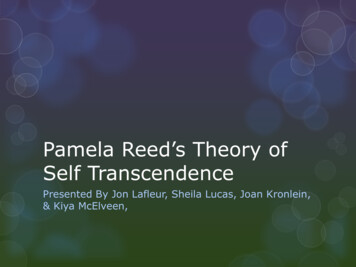
Transcription
Pamela Reed’s Theory ofSelf TranscendencePresented By Jon Lafleur, Sheila Lucas, Joan Kronlein,& Kiya McElveen,
IntroductionThis presentation will review and analyze Reed’s theory ofself transcendence. The presenter will give an overview ofthe theory and review it’s views of the nursingmetaparadigms. The presenter will discuss a researcharticle that uses Reed’s theory as well as examine theapplication of the theory with nursing practice.
Objectives Define the theory of self transcendence Understand the theory’s concepts of the metaparadigmsof nursing Understand the relationship of the theory with yourpractice
Background on Theorist - PamelaReed Born in Detroit, Michigan Baccalaureate degree from Wayne State University-1974 Master of science in psychiatric-mental health of childrenand adolescents and in nursing education-1976 PhD concentration in nursing theory and research, minor inadult development and aging-1982 Dissertation research focused on relationship between wellbeing and spiritual perspectives on life and death interminally ill and well individuals.Masters, K. (2012).
Self-Transcendence: Overview The Theory of Self-Transcendence is a social concepttheory which is based on Rogers’ Theory of UnitaryBeings. Core “philosophical belief in the enduring humanpotential for well-being” (Reed, 2009, p. 397). “Individuals who face human vulnerability or mortalityobtain an increased capacity for self-transcendence andits positive influence on well-being” (Reed, 2009, p.397-398).
Self-Transcendence: Overview Definition by Reed: “Inherent, gradual, non-lineardevelopmental process, resulting in increased awarenessof dimensions greater than the self and expansions ofpersonal boundaries within intrapersonal, interpersonal,transpersonal, and temporal domains” (McCarthy, Ling,Carini, 2013, p. 179).
MetaParadigm Concepts Health – “Sense of feeling whole and healthy, in accordto one’s own criteria for wholeness and health” (Smith,et al, 2008. pp. 108) Environment – Family, social networks, physicalsurroundings and community resources (Coward, 2010as cited in Masters, 2014.pp. 75Photo Retrieved from Daggerwing Health
MetaParadigm Concepts cont. Human Being – Developed though life events andenvironments Nursing – the assistance through interpersonalprocesses and therapeutic management of environmentsto promote health ( Coward, 2010. as cited in Masters,2014. pp. 75)
Analysis Reed’s theory of Self Transcendence is related to theongoing developmental relationship between a humanbeing and their environments Reed’s theory was originally intended to describe aperson’s mental health and wellbeing during the lateryears of life (nearing end of life), yet it has muchimportance relating to children and adolescents
Self-Transcendence: Analysis Criteria Accuracy Simplicity/Complexity Scopedepends on the context Acceptance Socio-Cultural Utilitybut needs more research(NURS 501)
Figure 1Gulliver (2007)
Figure 2Gulliver (2007)
Self-Transcendence is To repeat: Looking beyond the “now”, beyond barriersand boundaries, looking beyond one’s self and findingperspective and meaning that might otherwise beoverlooked.(Ellerman and Reed, 2001; Palmer, Quinn Griffin, Reed, & Fitzpatrick, 2010) Capitalizing on the ability to see beyond the boundariesof the self and the environment. Using that ability duringvulnerable moments to see beyond the presentlimitations.(Runquist & Reed, 2007) Vulnerability can lead to self-transcendence. Selftranscendence can lead to well-being.(Palmer, Quinn Griffin, Reed, & Fitzpatrick, 2010)
Self Transcendence in NursingResearch Research by Walsh, Lamet, Lindgren, Rillstone, Little,Steffey, Rafalko, & Sonshine (2011) reviewed the theoryof self transcendence in patients with late stageAlzheimer’s Disease. Studied the effects of self transcendence and well beingas a result of creative bonding interventions
How is the theory of selfTranscendence reflected in thisresearch? Research Questions: “Will persons with late stage Alzheimer's Disease showevidence of self transcendence during the creative bondingintervention?” “Will persons with late stage Alzheimer's disease showevidence of well-being during the creative bondingintervention?”
How would the study have beendifferent without Reed’s theory? Without theory of self transcendence the researcher'swould only be able to conduct research on the secondresearch question related to well being. Would be difficult to analyze the patients relationshipwith the surrounding environment and the use ofreminiscing with the patient's raw emotions without thistheory
The study provided insight for new areas of educationfor staff involvement and techniques to use with latestage Alzheimer's Disease. This research used the theory of Self Transcendence topromote the use of nursing “implementation ofapproaches to promote well-being in people with latestage Alzheimer's Disease” (Walsh, et al, 2011. pp71).
Implication for Nursing “Most health events confront a person with vulnerabilityand mortality and therefore are potential context forpromoting healing and well being through selftranscendence” (Smith, et al. 2008. pp122) Nurses should use Reed’s theory of self transcendence tofacilitate self-transcendence.
How Nursing can help ManageSelf Transcendence in Patients Encouraging Reflection Meditation, Prayer, Journaling Fostering Maintenance of Meaningful Relationships Personal and community relationships Support Groups Group psychotherapy
NursingPositiveHealingExperiencesSelfTranscendence
Importance for Nursing practice Advances nursing knowledgerelating to diseasemanagement Helps nurses expand on givingholistic careHast, 2009.
“Self-transcendence may very well be a developmentalimperative for younger as well as older people, for thosehealthy and ill. If so, nursing must be there to generatethe knowledge and provide the expert support thatfacilitates this cost-effective and holistic process of wellbeing” ( Smith, et al, 2008. pp 126)
References Daggerwing Health Group. (2013). Retrieved fromhttp://www.daggerwinghealth.com/ Dudley-Brown, S. L. (1997). The evaluation of nursing theory: amethod for our madness. International Journal of NursingStudies, 34(1), 76–83. 6303.pdf new/eng/data/files/ Ellerman, C.R., & Reed, P.G. (2001). Self-transcendence anddepression in middle-aged adults. Western Journal ofNursingResearch, 23(7), 696-713. Gulliver, K. 2007. Middle- Range Theory of Self Transcendence, AGraphic Representation. raphic.htm Hast, L. (2009). New Website highlights nursing research efforts.Reporter. Retrieved tml?ID 7588
References Cont Masters, K. (2014). Role Development in ProfessionalNursing 3rd ed.Jones and Barlett Learning. Burlington, MA.Retrieved from:http://books.google.com/books?id 8MHDezDyqTwC&pg PA74&lpg PA74&dq theory of self transcendence and metaparadigm concepts&source bl&ots Ss8NnPql0p&sig jDw 8abgL9amk9QzrsOUCAiHhc0&hl en&sa X&ei pmlQUsKiIsjFqgH50oHIAg&sqi 2&ved 0CEYQ6AEwBA#v onepage&q adigm%20concepts&f true Palmer, B., Quinn Griffin, M.T., Reed, P., & Fitzpatrick, J.J.(2010). Self-transcendence and work engagement inacute care staff registered nurses. Critical Care Nurse,33(2), 138-147. Runquist, J.J., & Reed, P.G. (2007). Self-transcendence andwell-being in homeless adults. Journal of Holistic Nursing,25(5), 5-13.
References Cont Smith, M., Liehr, P. (2008). Middle Range Theory forNursing, 2nd Ed. Springer Publishing Company LLC. NewYork, NY. Retrieved from:http://books.google.com/books?id BxrrFVwW4PgC&pg PA105&lpg PA105&dq pamela reed theory of self transcendence&source bl&ots RYHKY7rtGE&sig G8F9F0Xn8GPZ4vbyd46q2Aw91ZY&hl en&sa X&ei wV1QUo6aBMKrrQGQloHgAQ&ved 0CDUQ6AEwAg#v onepage&q pamela%20reed%20theory%20of%20self%20tra nscendence&f true Walsh, S., Lamet, A., Lindgren, C., Rillstone, P., Little, D.,Steffey, C., Rafalko, S., Sonshine, R. (2011). Art inAlzheimer's care:promoting well-being in people withlate-stage Alzheimer'sdisease. Rehabilitation Nursing,36(2), 66-72. Retrieved from ct.asp?AccessToken 293939A8SHF2BFYES2LL1W9WFWBX8F9A19&Show Object
Background on Theorist - Pamela Reed Born in Detroit, Michigan Baccalaureate degree from Wayne State University-1974 Master of science in psychiatric-mental health of children



